Episodes
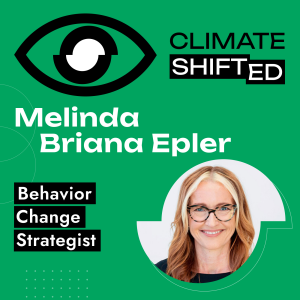
Tuesday Jun 10, 2025
Tuesday Jun 10, 2025
In this episode of Climate Shifted, host Eva Frye speaks with Melinda Briana Epler, a TED Speaker and behavior change strategist who has worked on national programs with organizations like the American Hospital Association. Melinda is currently authoring a whitepaper on climate communication best practices called Our Moment is Now, out soon.
Discover why fear-based climate messaging burns people out, how to move audiences up Maslow's hierarchy of needs to create lasting change, and why listening might be the most powerful tool in a climate communicator's toolkit. Learn practical frameworks for designing user journeys that meet people where they are and guide them toward sustained climate action over time.
Full Transcript Found Here
Key Topics Covered
The Psychology of Climate Motivation
Why fear and guilt are unsustainable motivators for climate action
How to use Maslow's hierarchy of needs in climate communications
The importance of moving from fear-based messaging to love and joy
Building identity-based climate action for lasting change
Behavior Change Strategy
The "trim tab" approach: finding small actions that create big impact
Stages of change model: from unconcerned to maintaining action
Meeting people where they are vs. where you want them to be
Designing user journeys for long-term engagement
Communication Tactics That Work
The power of listening before speaking
Why storytelling beats abstract messaging
Building trust through community ambassadors
Moving from individual awareness to policy change
Bridging Political Divides
Whether to engage dismissive audiences or focus on the converted
Finding common ground across political differences
Learning from bipartisan policy successes
The role of trusted messengers in polarized times
Standout Quotes
"Often people want to just go right to the solution and jump into building awareness... But I would say you need to take a step back to really understand the problem that you're trying to solve."
"Fear is a common emotion that can be evoked by climate communications... And it's not a sustainable emotion. That's why climate anxiety is on the rise."
"If somebody identifies as somebody that takes climate action, they're much more open to taking other climate actions."
"The number one role in communications I would say is listening. First really understanding where people are coming from."
Featured Research & Resources
Melinda's Climate Communication Research:
Our Moment is Now: Best Practices in Climate Communication - Executive summary available now, full research paper coming soon
Featured Interview:
Nisha Anand on Bipartisan Climate Policy - CEO of Dream.org discusses building bridges across political divides
Key Frameworks Mentioned:
Stages of Change Model for behavior design
Maslow's Hierarchy of Needs for motivation
Yale's Six Americas climate audience segmentation
Community-based social marketing approaches
Organizations & People Mentioned
Dream.org - Nisha Anand's organization focused on bipartisan policy change
American Hospital Association - Partner on national energy efficiency program
Nature Conservancy - Example of nonpartisan environmental approach
Greenpeace - Contrasted as confrontational vs. collaborative approach
Dr. Katherine Hayhoe - Climate scientist and communication expert
Dr. Renee Lertzman - Environmental psychologist
George Marshall - Author of "Don't Even Think About It"
Brené Brown - Researcher on shame and vulnerability
Juicy Bits: Key Takeaways for Climate Communicators
Start with systems thinking - Find the "trim tab" - the smallest action that creates the biggest impact
Listen first, speak second - Understanding where people are now is more important than where you want them to be
Move beyond fear - Use fear only as an initial trigger, then transition to hope, love, and identity-based motivation
Design for the long term - Create user journeys that move people through stages of change over time
Find trusted messengers - Work with community ambassadors when your audience doesn't trust you directly
Seek common ground - Even dismissive audiences can be engaged when you find shared values
Measure what matters - Track behavior change, not just awareness metrics
Sustain yourself - Connect with what brings you joy to avoid burnout in this challenging work
Connect with Melinda
Website: melindabrianaepler.com
LinkedIn: Melinda Briana Epler
Instagram: @melindabrianaepler
Call to Action
Climate communication doesn't have to rely on fear and guilt. Download Melinda's executive summary on climate communication best practices and start designing behavior change campaigns that meet people where they are and guide them toward lasting action.
Subscribe to Climate Shifted wherever you listen to podcasts and follow @climateshifted on social media for more expert insights on what actually works to shift hearts and minds on climate.
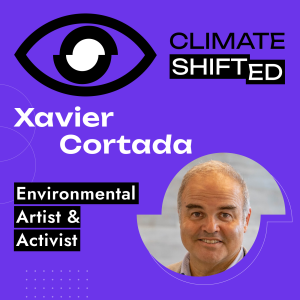
Tuesday May 20, 2025
Tuesday May 20, 2025
In this episode of Climate Shifted, host Eva Frye speaks with Xavier Cortada, a socially engaged environmental artist and Florida Artist Hall of Fame member. He creates participatory art projects transforming how communities understand and respond to the climate crisis.
Xavier shares how his "Underwater Homeowners Association" project used lawn signs showing home elevation levels to make sea level rise personally relevant to inland residents, how he strategically uses art to invite curiosity rather than confrontation, and how he builds coalitions with local institutions to create lasting policy change.
Learn how his approach to "social practice art" sculpts people instead of clay, makes topics personal to bypass political polarization, and discover how anyone can get started doing projects like this in your own communities.
Transcript available here
Key Topics
Using "social practice art" to create community climate engagement
Making abstract climate threats personally relevant through art
Designing art experiences that invite curiosity rather than confrontation
Building strategic partnerships with municipalities, schools, and nonprofits
Creating platforms for civic engagement beyond awareness
Moving from individual action to policy change
Balancing different communication approaches for different audiences
Starting with personal passion rather than waiting for permission
Finding sustainable motivation through love rather than fear
Quotes
"Art allows you to see things differently, but it also allows you to behave differently. And you then model to those who aren't part of the process, how they too can do the same thing." - Xavier Cortada
"My way in was the yard sign. What's this weird number doing in my neighbor's front yard? And then that curiosity allows you to understand that you have a vulnerability, that it's not someone else's problem, it's your problem." - Xavier Cortada
"What I try to do is journey into this land called hope, and art gets us there." - Xavier Cortada
"At the end of the day I'm not trying to change human behavior. I'm trying to change the policies that allow corporate interests to exploit people and to extract from our environment." - Xavier Cortada
People & Organizations Mentioned
Xavier Cortada - Socially engaged environmental artist and Florida Artist Hall of Fame member
Underwater Homeowners Association - Community organization created through Cortada's art project
Cortada Foundation - Organization founded to scale Cortada's climate art approach
Natural Resources Defense Council - Environmental organization that partnered with Cortada on the Blake Plateau project
Joseph Beuys - Pioneering social practice artist mentioned as an influence
Notable Art Installations Discussed
Underwater Homeowners Association: A participatory art project where residents displayed signs showing their home's elevation above sea level, transforming abstract sea level rise data into personal concerns about property values and flood insurance.
Elevation Markers: Street paintings showing elevation levels at intersections throughout Miami, demonstrating how even areas miles inland were vulnerable to sea level rise.
Park Elevation Sculptures: Vague concrete sculptures with QR codes in parks that, when scanned, revealed the park's elevation and sea level rise projections.
Reclamation Project: An installation where mangrove seedlings were displayed in water-filled cups on retail storefronts throughout Miami Beach, revealing the area's history as a mangrove forest before development.
JUICY BITS: Takeaways for Climate Communicators
Believe in yourself: Understand that you have a voice and role in delivering the future you want. Combat imposter syndrome - if you doubt yourself, you've already lost.
Believe in others: Recognize you can't create change alone. Value the unique perspectives and skills others bring and believe they too have a seat at the table.
Don't give up: Persist even through difficult challenges. Continue pushing forward when questioning if the work is worth it, especially when trying to change entrenched systems.
Make climate personal: Transform abstract global issues into immediate local concerns that connect to what people already value (like property values or flood insurance).
Invite curiosity over confrontation: Create experiences that spark questions rather than forcing information, allowing people to discover climate issues through their own inquiry.
Build platforms for agency: Move beyond awareness to give people tools and spaces for collective action, connecting concerned citizens with relevant experts and policymakers.
Call to Action
Subscribe to Climate Shifted wherever you listen to podcasts
Follow @climateshifted on all social media platforms
Share this episode with friends interested in climate communication
Check out Xavier Cortada's work at cortadafoundation.org
Consider how you might make climate issues visible and personal in your own community
Credits
Executive Producer & Host - Eva Frye
Technical Producers - Mateus Salgado
Audio engineer - Gianna Scioletti
Project management - Sarah Clayton
Advisers - Ryan Shuken, Ashley Chapman, Chris Clark
Nature sounds from bbc.co.uk – © copyright 2025 BBC
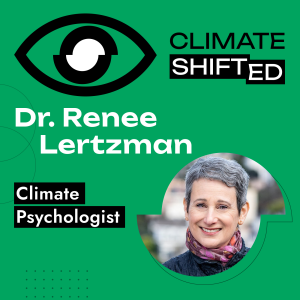
Tuesday Apr 29, 2025
Tuesday Apr 29, 2025
In this episode of Climate Shifted, host Eva Frye speaks with Dr. Renee Lertzman, a pioneer in climate psychology who is transforming how we communicate about our planet's future. While most climate messaging bombards us with facts or terrifies us with doomsday scenarios, Renee's approach taps into something deeper: our human need to feel heard before we can change. Her groundbreaking work with Project Inside Out reveals why traditional "yelling, telling and selling" tactics fail so spectacularly with climate issues—they actually trigger defensiveness. Instead, Renee offers frameworks that help us become guides who create genuine dialogue rather than delivering monologues. Her approach is built on the same psychological techniques that help people overcome addiction—some of the most difficult behavior change imaginable. Whether you're an activist looking for new tools, a communicator hitting walls, or simply someone who cares and wants to share effectively, this conversation provides practical frameworks to transform how you engage with people about the climate crisis.
Transcript available here
Key Topics
Moving beyond "yell, tell, sell" approaches to climate communication
Using motivational interviewing techniques to create dialogue instead of defensiveness
The importance of acknowledging anxiety, ambivalence, and aspiration
Becoming a "guide" rather than an educator or cheerleader
Addressing polarization through empathetic listening
Creating sustainable activism campaigns that don't traumatize people
Using attunement and relational approaches even for urgent campaigns
Quotes
"Your job is to draw out from others what their concerns are, values, volition for change, and it's actually massively more impactful and effective than what I call yell, tell, and sell." - Renee Lertzman
"How to become a climate communication “guide”? The first step is to become very self-aware and with a lot of compassion, to go through a bit of an internal reflection on how am I showing up?" - Renee Lertzman
"It was crystal clear that we needed to be bridging these worlds of psychological insight with, what does it mean to actually come to terms with climate issues as well as how did we get here?" - Renee Lertzman
"It's very hard to do this work effectively unless you have a pretty high level of self-awareness." - Renee Lertzman
"A really good guide also is tuned in to how people are doing. And so, it's always a matter of balancing the 'take action now' with, 'I get it. Maybe this is upsetting to you, but we need to take action anyway.'" - Renee Lertzman
People & Organizations Mentioned
Dr. Renee Lertzman - Climate psychologist and strategic advisor
Project Inside Out - Resource platform for climate communication
Alliance for Climate Education - Organization that worked with Renee on a video about how to talk about climate change
Victor Frankl - Psychologist whose work Renee references
Dan Siegel - Neuropsychologist mentioned for "name it to tame it" concept
Barbara Ehrenreich - Author of "Nickel and Dimed"
Van Jones - Activist mentioned for his ability to bridge divides
Amy Edmondson - Harvard professor and expert on leadership development
JUICY BITS: Takeaways for Climate Communicators
Shift from educator to guide: Learn to create invitations for dialogue rather than lectures that trigger defensiveness.
Practice the three A's: Acknowledge anxiety, ambivalence, and aspiration in your audience to create deeper connection.
Use "Ask, Offer, Ask" (AOA): Start by asking about experience, offer information with permission, then ask for reflection.
Create reflective pauses: Help people find the space between stimulus and response where change can happen.
Practice "name it to tame it": Naming feelings reduces their charge and makes them more manageable.
Call to Action
Subscribe to Climate Shifted wherever you listen to podcasts
Follow @climateshifted on all social media platforms
Share this episode with friends interested in climate communication
Visit projectinsideout.net for resources on effective climate engagement
Follow Renee's work at reneelertzman.com and subscribe to her Substack "Becoming Guides"
Credits
Executive Producer & Host - Eva Frye
Technical Producer - Mateus Salgado
Adviser - Ryan Shuken
Audio engineer - Gianna Scioletti
Project management - Sarah Clayton
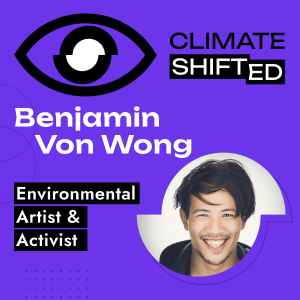
Monday Apr 07, 2025
Monday Apr 07, 2025
In this episode of Climate Shifted, host Eva Frye speaks with Benjamin Von Wong, an environmental artist and activist who creates large-scale art installations to make climate issues accessible to wider audiences. Benjamin shares how he uses familiar cultural metaphors to draw people into climate conversations, strategically places his art to influence decision-makers, and approaches climate work from love rather than duty. Learn how his installations like the four-story "Turn Off the Plastic Tap" sculpture and "Biodiversity Jenga" use recognizable concepts to make complex environmental issues instantly understandable, and discover his insights on creating sustainable activism practices that avoid burnout.
Transcript available here
Key Topics
Using popular cultural metaphors to make climate issues more accessible
Strategic placement of art installations to influence policy decisions
Transitioning from duty-based climate work to love-based activism
Creating large-scale art that requires no words to explain
Building relationships instead of chasing social media algorithms
Developing sustainable activism practices to avoid burnout
Using art as a "top of funnel" to draw new people into climate conversations
Quotes
"I try to think of popular metaphors or popular cultural tropes that I can hijack." - Benjamin Von Wong
"Coming at things from a place of love, it's almost like a privilege to be able to show up and to offer yourself in the fullest most complete way." - Benjamin Von Wong
"My role is to simply provide a piece of art that is as universal as possible that any organization or even a company or a government, regardless of where they are on the journey, can find utility in what I'm creating." - Benjamin Von Wong
"The ultimate goal of mine is to be able to constantly create work that requires no words to explain." - Benjamin Von Wong
"As climate professionals, we spend a lot of time thinking about regeneration and sustainability for the outside world. I think we also need to put up a mirror every so often and think about how are we making our work and career path sustainable and regenerative." - Benjamin Von Wong
People & Organizations Mentioned
Benjamin Von Wong - Environmental artist and activist
United Nations Environmental Assembly - Venue for the "Turn Off the Plastic Tap" installation
Sir David Attenborough - Mentioned as an influential environmentalist
Notable Art Installations Discussed
Turn Off the Plastic Tap: A four-story tall sculpture resembling a faucet spewing plastic trash, installed at the United Nations Environmental Assembly where delegates were voting on plastic treaties. The installation gave physical form to the phrase "turning off the plastic tap" used in negotiations.
Biodiversity Jenga: A two-and-a-half story tall Jenga tower where each block represents a different ecosystem, demonstrating how removing elements of biodiversity could lead to collapse. Created with 200 students who made 150 animal figures to populate the installation.
Straw-pocalypse: An installation made of 168,000 plastic straws, illustrating what happens when we pour plastics into the ocean.
Mermaid on Plastic Bottles: An installation featuring a mermaid on 10,000 plastic bottles to raise awareness about plastic pollution.
JUICY BITS: Takeaways for Climate Communicators
Make it irresistible: Create environmental messaging that invites curiosity instead of hitting people over the head with information.
Approach climate work from love, not duty: When you connect with what you're protecting and approach climate work from love rather than obligation, activism becomes sustaining rather than draining.
Use familiar metaphors: Leverage recognizable concepts (like Jenga) as shortcuts to make complex problems instantly understandable - the art should require no words to explain.
Think ecosystem, not individual: Remember that your work is part of a broader ecosystem of solutions. Focus on the role you can play rather than trying to solve everything yourself.
Distribution matters: Package your work so it's easy for journalists and organizations to share with their followers, ensuring the right eyes see your work without relying on fickle algorithms.
Call to Action
Subscribe to Climate Shifted wherever you listen to podcasts
Follow @climateshifted on all social media platforms
Share this episode with friends interested in climate communication
Check out Benjamin Von Wong's work at unforgettablelabs.com or by searching "Von Wong" online
RSVP for the Climate Shifted launch party "Resilience: Stories of Renewal" on April 25th at KALW Radio Station in San Francisco at climateshifted.com or https://lu.ma/ok1v6rxd
Credits
Executive Producer & Host - Eva Frye
Technical Producer - Mateus Salgado
Adviser - Ryan Shuken
Audio engineer - Gianna Scioletti
Project management - Sarah Clayton
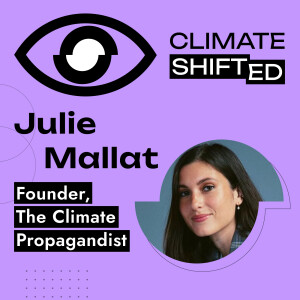
Friday Mar 21, 2025
Friday Mar 21, 2025
In this episode of Climate Shifted, host Eva Frye speaks with Julie Mallat, founder of The Climate Propagandist. Julie shares how she studies propaganda and persuasion techniques to help climate advocates craft more compelling messages that stick and spread. Learn how big oil has weaponized propaganda for decades and how we can flip their tactics to drive climate action. Explore what makes messages stick, Michael Mann's 5Ds framework for understanding corporate delay tactics, and why hope might be the biggest threat to polluting industries.
Transcript available
Key Topics
How propaganda techniques can be used for positive climate communication
The evolution of fossil fuel industry propaganda tactics
Michael Mann's 5Ds framework to understand fossil fuel’s climate delay: Deflection, Delay, Division, Despair, and Doomism
What makes messages stick and spread in the digital age
How to measure impact in culture-based climate action
Strategies for climate communicators to build effective campaigns
Quotes
"We're not just in a battle of science, we're in a battle of narratives." - Julie Mallat
"Climate communication doesn't have to be boring or academic. It can be engaging, impactful. It can be easy to digest." - Julie Mallat
"Hope is actually a direct threat to their agenda." - Julie Mallat
People & Organizations Mentioned
Julie Mallat - Founder of The Climate Propagandist
Michael Mann - Scientist who developed the 5Ds framework of climate delay tactics
Adrienne Maree Brown - Author mentioned regarding pleasure activism
Notable Ads & Campaigns Discussed
Energy Transfer Hospital Ad: A controversial commercial showing a couple rushing to a hospital for childbirth, only to find it dark and empty, implying that ending fossil fuel use would lead to healthcare system failures. This exemplifies fear-based propaganda designed to convince the public that transitioning away from fossil fuels would be catastrophic. Watch here
Parents for Future Campaign: An impactful campaign where British parents casually apologize for small daily mistakes before a mother looks at her baby and apologizes while climate disasters play out on TV. This campaign effectively leverages the "good ancestor frame," making people feel responsible for future generations. Watch here
Clean Creatives Campaign: Organization behind campaign calling out agencies working with fossil fuel clients. Read here
Audio quotes
President public quotes - DMW, WSJ
"I Have a dream" public speech by MLK, YT
JUICY BITS: Takeaways for Climate Communicators
Think like a propagandist - Use the "stick and spread" method to craft narratives that both stick in people's minds and spread through populations.
Use culture as a vehicle - Don't just inform people, but change what's considered normal to make sustainability mainstream.
Be bold and subversive - The climate crisis is urgent, and communication tactics should reflect that urgency by challenging norms.
Call to Action
Subscribe to Climate Shifted wherever you listen to podcasts
Follow @climateshifted and @thewclimatepropagandist on all social media platforms, and on Substack
Share this episode with friends interested in climate communication
Credits
Executive Producer & Host - Eva Frye
Technical Producer - Mateus Salgado
Adviser - Ryan Shuken
Project management - Sarah Clayton
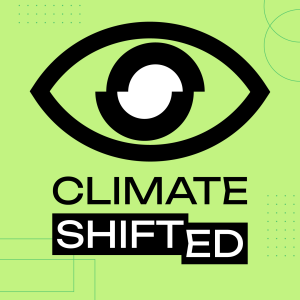
Monday Mar 10, 2025
Monday Mar 10, 2025
Podcast where psychologists, behavior designers, artivists & movement builders share how to shift perception for climate action.
Featuring guests like Dr. Renee Lertzman, Xavier Cortada, Melinda Briana Epler, Autumn Leiker, Benjamin Von Wong, and more.
Credits
Executive Producer & Host - Eva Frye
Technical Producer - Mateus Salgado
Sources
George Marshall on The Naked Scientists
Dr. Renee Lertzman on TWM#61 videocast by Dr Matthew Goodman
Adrienne Maree Brown on Laura Flanders & Friends





